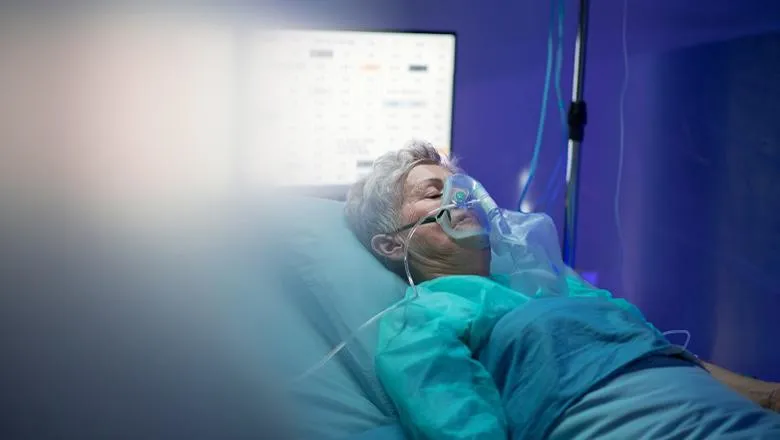We hope that our study will make clinicians aware of the psychiatric issues that may arise during and after coronavirus infection so they can continue to deliver high-quality care in what can be very complex and difficult situations.
Co-lead author Edward Chesney from the Institute of Psychiatry, Psychology & Neuroscience (IoPPN), King’s College London and South London and Maudsley NHS Foundation Trust
18 May 2020
New study assesses mental health consequences of severe coronavirus infections
A collaborative study between King’s College London and UCL has found that nearly a third of patients with severe coronavirus infections experienced a range of psychiatric problems in the months and years after infection. These include post-traumatic stress disorder, depression and anxiety disorders as well as symptoms such as poor concentration, irritability and insomnia.

Published in The Lancet Psychiatry, the researchers conducted a systematic review and identified 72 relevant studies that analysed psychiatric signs, symptoms, diagnoses and adverse effects both during and after two previous coronavirus outbreaks (SARS and MERS) and the current COVID-19 pandemic.
This is the first research that has conducted such a detailed review of all studies describing the consequences of coronavirus infections in terms of psychiatric symptoms and conditions.
The research showed that during short-term infection with SARS and MERS resulting in hospitalisation, confusion occurred in between 7 and 33% of patients, suggesting that delirium was a common feature. Low mood, anxiety, insomnia, impaired memory and impaired concentration were other psychiatric symptoms during illness which were reported in more than 30% of cases. Mania and psychosis occurred in less than 1% of patients and was almost entirely related to treatment with corticosteroids, which are not commonly being used to treat COVID-19.
After the infection and in the longer term, the study showed that fatigue, frequent traumatic memories, memory problems, impaired concentration, low mood, irritability and insomnia were reported most often. According to researchers, there were high rates of anxiety disorders (11-20%), depression (12-18%), and post-traumatic stress disorder (23-44%) after infection with SARS or MERS and that measures of quality of life were lower in post-SARS patients compared to control groups.
The researchers also examined emerging evidence from the COVID-19 pandemic. They identified 5 peer-reviewed studies and 7 pre-prints. There was evidence for delirium (confusion, agitation and altered consciousness) in some patients, with one report describing agitation in 69% of patients who had been on an Intensive Care Unit (ICU). Symptoms of anxiety and depression were also common in the acute illness, but these improved significantly after being discharged from hospital. They also found that a dysexecutive syndrome, which comprises of inattention, disorientation, or poorly organized movements in response to command,may occur after discharge from intensive care.
Co-lead author Edward Chesney from the Institute of Psychiatry, Psychology & Neuroscience (IoPPN), King’s College London and South London and Maudsley NHS Foundation Trust said: ‘We hope that our study will make clinicians aware of the psychiatric issues that may arise during and after coronavirus infection so they can continue to deliver high-quality care in what can be very complex and difficult situations. During the acute infection, this could mean regular screening of patients for delirium, whilst after infection it could involve finding ways to support patients struggling with low mood, anxiety or traumatic experiences. Our review can also inform policy makers of the potential long-term impact of the COVID-19 pandemic on mental health and which services may need additional resources in the years to come.’
The study also set out to identify reports of any neuropsychiatric complications, such as psychiatric consequences of seizures and swelling of the brain and found little evidence, at this point in time, that these types of complications occur with coronavirus infection beyond short-term delirium.
Most people with COVID-19 will not develop any mental health problems, even among those with severe cases requiring hospitalisation, but given the huge numbers of people getting sick, the global impact on mental health could be considerable
Co-lead author Dr Jonathan Rogers from UCL Institute of Mental Health and South London and Maudsley NHS Foundation Trust
A handful of studies included in the review explored factors that predispose people to suffer from psychiatric complications during or after infection with a coronavirus. These suggested that healthcare workers, those with prior mental illness, those bereaved by the outbreak and individuals with enduring physical complications of coronavirus infection should be considered high-risk groups.
Most of the 72 studies considered the SARS epidemics in Hong-Kong, China and Canada or the MERS epidemics in South Korea and Saudi Arabia. 25 of these analysed what can happen during illness, including signs, symptoms, diagnoses of psychiatric disorders and adverse effects on mental health. 40 studies looked at the signs, symptoms and diagnoses from 2 months to 12 years after infection with SARS or MERS. Even though there are large differences between the mortality associated with each infection, the study focussed on patients who had been hospitalised which should improve comparability between them.
Much of the recent focus on the effects of coronavirus infection has understandably been on acute, physical symptoms. This review is important because it indicates that these infections can also lead to a range of significant psychiatric problems. Moreover, these occur in a substantial proportion of patients, and may persist after the acute phase of infection.
Co-author on the study, Professor Philip McGuire from the IoPPN, King's College London
The research was a collaboration between UCL and King’s College London, combining expertise from psychiatric, neuropsychiatric, epidemiological and infectious disease researchers to effectively review all of the available evidence.
Co-lead author, Edward Chesney, commented: ‘Collaboration has been a hallmark of high quality scientific research over the past few decades and it is even more necessary now to deliver essential, timely information to clinicians, researchers and policy makers.’
Researchers emphasized that few of the studies made comparisons with control groups, meaning it was hard to separate the effects of the infection from the impact of an epidemic on the population as a whole.
The research excluded studies investigating the indirect effects of coronavirus infections on mental health mediated through social distancing measures such as self-isolation or quarantine because these have been recently appraised in research in The Lancet by King’s College London researchers.
The study also considered pre-prints (research papers that have yet to be formally peer-reviewed and published) in order to include the latest research on the current COVID-19 pandemic.
Reference: Rogers, J.P et al (2020) Psychiatric and neuropsychiatric presentations associated with severe coronavirus infections: a systematic review and meta-analysis with comparison to the COVID-19 pandemic. The Lancet Psychiatry DOI: 10.1016/S2215-0366(20)30203-0
Contact: Franca Davenport, Interim Senior Press Officer, IoPPN, King's College London
Em: franca.davenport@kcl.ac.uk Tel: +44 7718 697176


